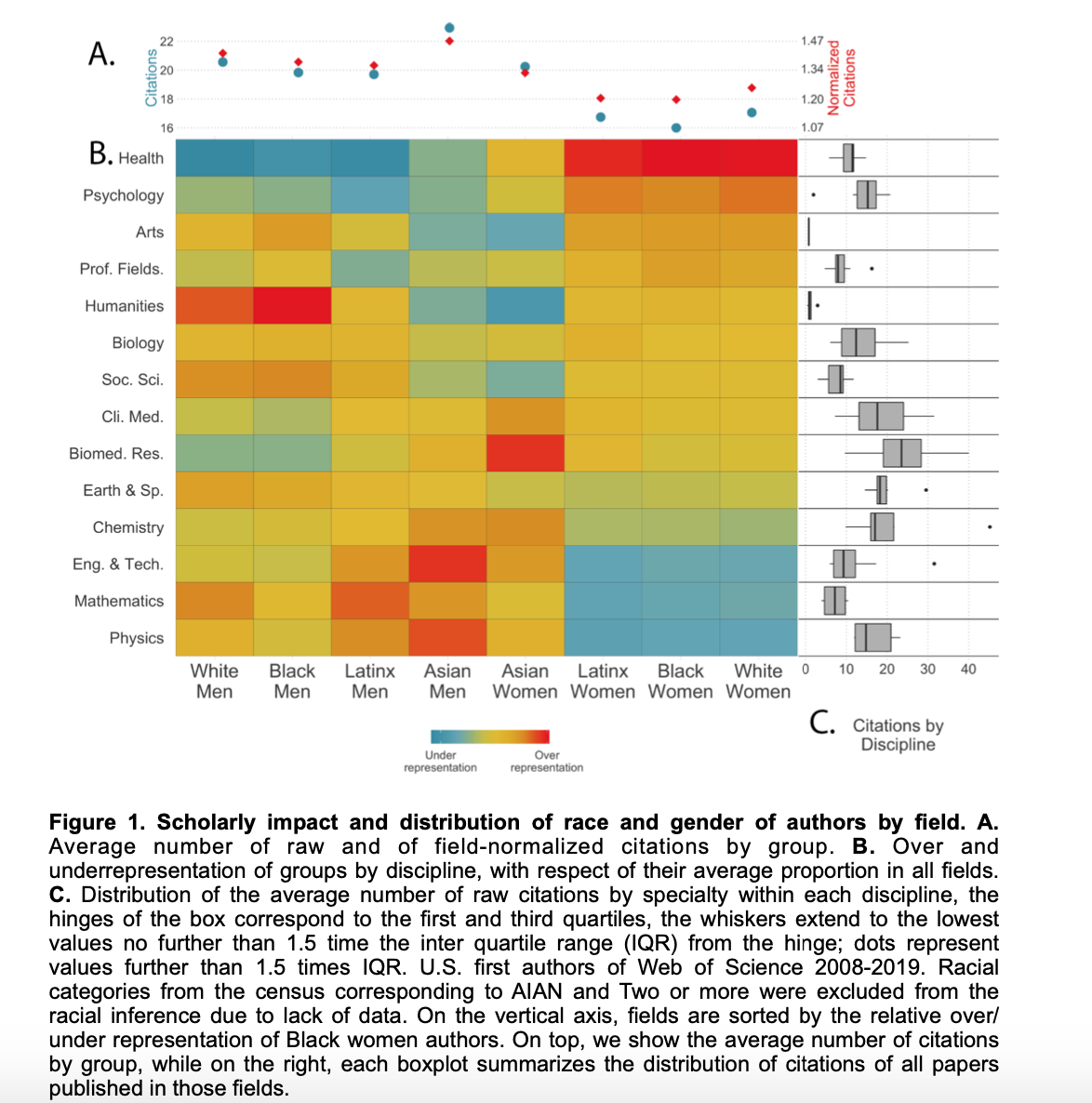You have /5 articles left.
Sign up for a free account or log in.

T. Kimura/iStock/Getty Images Plus
A new study of millions of academic papers and the scholars who wrote them finds a connection between lead authors’ racial and gender identities and their research topics—and that underrepresented groups are overrepresented in topics with relatively low citation counts.
The study’s authors say these trends limit both individual and scientific advancement. They urge more access to science for nonwhite scholars and women, plus more funding for the research they pursue.
A ‘Coarse’ Counterfactual
Co-author Thema Monroe-White, an assistant professor of management information systems at Berry College, in Georgia, said her and her colleagues’ data push back on persistent, “idealized notions of meritocracy in science.”
If science really was a meritocracy, Monroe-White said, “there would not be a relationship between race and gender, research topic and impact. That there is one demonstrates that advances in scientific knowledge are shaped by socially constructed, nonmeritocratic factors.”
As the study notes, “The compound effect of different citation rates of topics and unequal distribution on topics by race and gender leads to negative effects for marginalized groups and for science itself, as some topics become systematically less studied … The diversification of the scientific workforce is necessary to create a scientific system whose results benefit all of society.”
Demonstrating how these dynamics hurt science in the long run, the study offers what it calls a “coarse” but striking counterfactual: if the demographics of scientists across fields more closely resembled those of the U.S. population, the last 40 years would have yielded 29 percent more articles in public health, 26 percent more on gender-based violence, 25 percent more on gynecology and gerontology, 20 percent more on immigrants and minorities, and 18 percent more on mental health.
Methods and Initial Findings
The new paper, published Monday in Proceedings of the National Academy of Sciences, is based on 5.4 million articles in articles indexed the Web of Science database between 2008 and 2019 and their 1.6 million distinct, U.S.-based first or lead authors. The analysis includes all fields, but the authors pay particular attention throughout the study to health, given that COVID-19 has highlighted racial disparities in health research and outcomes, and because recent studies show disparities in research funding for scholars of color.
First-author race and gender were inferred using census and other data. The paper acknowledges that this limits the scope of the study to binary genders only.
Compared to the general U.S. population, the researchers found that white and Asian populations are overrepresented among first authors over all, while Black and Latinx populations are underrepresented.
Relative representation varies by field, as Black, Latinx and white women tend to be highly underrepresented in physics, mathematics and engineering and overrepresented in health, psychology and the arts. Asian women are underrepresented in the arts, humanities and social sciences and overrepresented in biomedical research, chemistry and clinical medicine.
Black, Latinx and white men, meanwhile, are underrepresented in psychology and health. Asian men are underrepresented in those topics, as well, and also underrepresented in the humanities and social sciences. Asian men are overrepresented in physics, engineering, math and chemistry, according to the study.
Male first authors are generally more cited than women, and Asian authors are more cited than Black, Latinx and white authors, both in raw citations and field-normalized citations, the study also says.
For white, Black and Latinx women, the citation gap shrinks when normalizing citation counts based on field, “showing that they are more present in lower-cited fields,” the study says. “Nevertheless, even when considering field-normalized citations, the gap remains.”

Identity and Topic Choice
Looking further at topic choice, social science fields with the highest share of Asian authors concern economics and logistics, such as research on stocks, consumers, firms and markets. By contrast, white and Black authors are least represented in these areas of research.
Black authors are highly represented on topics of racial discrimination, African American culture and African studies and communities, the paper says. Religion is one of the few topics where both Black and white men are overrepresented.
Latinx authors are highly represented in topics related to immigrants, political identity and (similar to Black authors) racial discrimination. Black and Latinx authors also research topics specific to language literacy, and to African and Latin American countries, respectively.
“Latinx authors publish on topics associated with Latin-American issues and those that redefine the Latinx identity within the U.S.,” the study notes. “Of particular interest is the topic of language literacy, which is both highly feminized and highly Latinx, and constitutes a mixture of a traditional gender role (teaching, related with reproductive labor) and the learning of a second language, a topic that is highly relevant to migrant communities.”
An advanced analysis giving each group a coefficient of variation regarding their participation of in various topics of each racial group’s proportion on topics suggests that Asian authors are highly specialized, focusing on certain topics, while white authors are present in a wider range of topics. Black and Latinx authors also show specialization, focusing on a smaller number of topics than white authors (who represent the majority of the author population).
At the intersection of race and gender, Black women authors, for example, are relatively well represented in topics such as equality promotion and social identity. Latinx women are represented in research on language, residential segregation, gender gaps, international migration, social class and the Global South, among other topics.
In health fields, the topics with the highest representation of Asian authors relate to China, proteins, cells and health economics and costs. Black authors publish more on topics about racial disparities and sexually transmitted diseases, with a special emphasis on African Americans among Black women and gay men for Black men. Latinx authors in health fields publish more on topics that mention the Latinx population, racial disparities (again, similar to Black authors) and English-Spanish language issues.
The most feminized topics, according to the study, are about nursing, pregnancy and education, reinforcing the notion that caregiving is a woman’s issue.
Matters of Impact
Regarding research impact as measured by citation counts, the average number of citations of a topic is positively correlated with the presence of Asian and white men, the study says.
In the social sciences, Asian men have a higher number of citations and tend to be more present within highly cited topics. White and Black men increase their relative number of citations to “equalize” those of Asian men in the highest-cited topics, the study says. Latinx men and Asian women follow a similar pattern but yield fewer citations for the highest-cited topics. Black, white and Latinx women form a “block” with systematically fewer citations than all other groups.
In health, gender differences are even more apparent. Regardless of race, men are significantly more cited along the distribution of topics, with white and Black men having slightly more citations than Asian and Latinx men. Women from all racial groups present a lower number of citations, with white women presenting a slightly higher number of citations for highly cited topics than Asian, Latinx and Black women, the study says: “This provides evidence of the intersectional between- and within-topic disadvantage for minoritized groups: 1) minoritized groups are over-represented in lowly-cited topics and underrepresented in highly cited topics, and 2) their work is less cited within and across topics, especially where they are underrepresented.”
Over all, the authors say that minoritized authors tend to publish in scientific disciplines and on research topics that reflect their gendered and racialized social identities. By contrast, white scholars and white men, in particular, enjoy “a privilege of choice in scientific knowledge production.” This explains their “ubiquity” across topics.
Ways Forward
The study recommends that scientific institutions recognize the existence of knowledge gaps related to author race and gender and “promote topics where gendered and racially minoritized authors are more present.”
Funding agencies can take “immediate action to allocate increased funding in areas that have been historically underrepresented,” the study also says. “Such funding will affect the entire academic reward system: funding is strongly correlated with productivity and impact, both of which are associated with institutional advancement and rewards.”
Co-author Cassidy Sugimoto, Professor and Tom and Marie Patton School Chair in the School of Public Policy at Georgia Institute of Technology, said she hopes to see various kinds of institutions “more aggressively pursue diversity and justice initiatives.” This could include increasing targeted hires at colleges and universities, changing federal agencies’ composition of funding portfolios, and “radically recomposing reviewing bodies for publication, awards and funding.”
She added, “Too many initiatives pay lip service to intersectional equity but do not invest the resources necessary for real change to occur.”
Monroe-White suggested that institutions and individual disciplines take action by “amplifying research produced by minoritized scholars,” particularly where their representation is relatively high but where their impact “remains marginalized.”
Increasing minoritized scholars’ representation in high-impact topics is another piece of the puzzle, she said.
Asia Eaton, an associate professor of psychology at Florida International University whose work is cited in the new paper but who was not involved in it, said the paper seems to have “solid” methods and appropriate intersectional framing, and that it touches on a “critically important” topic. Eaton argued only with the paper’s partial conclusion that minoritized scholars need more access to “high-prestige networks and topics.”
“I couldn’t agree less,” Eaton said of that notion. Instead, she said, “the topics minoritized individuals already study need to be accorded the merit and funding they deserve.”
Citing a recent study led by psychologist Alysson Light, Eaton said it’s “not that minorities gravitate towards marginal and derogated topics. It is that whatever they study becomes marginal, because it is associated with them.” So rather than encouraging underrepresented scholars to study topics that are considered more mainstream, she said, “we should make efforts to fund the very important work they already do and are drawn to—which often involves solving practical problems for communities they care about or belong to.”
Eaton noted that the study “happily” makes this point about funding, as well.





